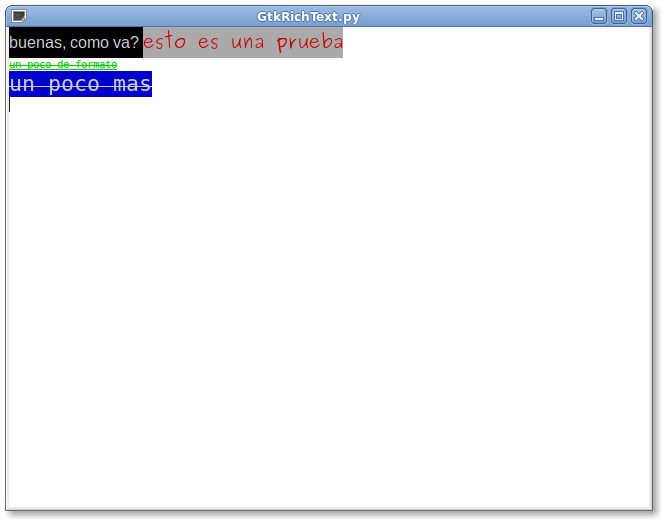Ejemplo sobre cómo mostrar texto con formato en un gtk.TextView, se crea una clase que extiende gtk.TextBuffer para facilitar la inserción de texto con formato.
'''a module that contains a class to insert rich text into a textview''' import gtk import pango class RichBuffer(gtk.TextBuffer): '''a buffer that makes it easy to manipulate a gtk textview with rich text''' def __init__(self): '''constructor''' gtk.TextBuffer.__init__(self) self.colormap = gtk.gdk.colormap_get_system() self.fg_tags = {} self.bg_tags = {} self.font_tags = {} self.size_tags = {} self.bold_tag = self.create_tag("bold", weight=pango.WEIGHT_BOLD) self.italic_tag = self.create_tag("italic", style=pango.STYLE_ITALIC) self.underline_tag = self.create_tag("underline", underline=pango.UNDERLINE_SINGLE) self.strike_tag = self.create_tag("strike", strikethrough=True) def put_text(self, text, fg_color=None, bg_color=None, font=None, size=None, bold=False, italic=False, underline=False, strike=False): '''insert text at the current position with the style defined by the optional parameters''' tags = self._parse_tags(fg_color, bg_color, font, size, bold, italic, underline, strike) iterator = self.get_iter_at_mark(self.get_insert()) self._insert(iterator, text, tags) def _insert(self, iterator, text, tags=None): '''insert text at the current position with the style defined by the optional parameters''' if tags is not None: self.insert_with_tags(iterator, text, *tags) else: self.insert(iterator, text) def _parse_tags(self, fg_color=None, bg_color=None, font=None, size=None, bold=False, italic=False, underline=False, strike=False): '''parse the parameters and return a list of tags to apply that format ''' tags = [] if fg_color: tag = self._parse_fg(fg_color) if tag: tags.append(tag) if bg_color: tag = self._parse_bg(bg_color) if tag: tags.append(tag) if font: tag = self._parse_font(font) if tag: tags.append(tag) if size: tag = self._parse_size(size) if tag: tags.append(tag) if bold: tags.append(self.bold_tag) if italic: tags.append(self.italic_tag) if underline: tags.append(self.underline_tag) if strike: tags.append(self.strike_tag) return tags def _parse_fg(self, value): '''parse the foreground color and return a tag''' if value in self.fg_tags: return self.fg_tags[value] try: color = gtk.gdk.color_parse(value) self.colormap.alloc_color(color) except ValueError: return None color_tag = self.create_tag('fg_' + value[1:], foreground_gdk=color) self.fg_tags[value] = color_tag return color_tag def _parse_bg(self, value): '''parse the background color and return a tag''' if value in self.bg_tags: return self.bg_tags[value] try: color = gtk.gdk.color_parse(value) self.colormap.alloc_color(color) except ValueError: return None color_tag = self.create_tag('bg_' + value[1:], background_gdk=color) self.bg_tags[value] = color_tag return color_tag def _parse_font(self, value): '''parse the font and return a tag''' if value in self.font_tags: return self.font_tags[value] font_tag = self.create_tag('font_' + value.replace(' ', '_'), font=value) self.font_tags[value] = font_tag return font_tag def _parse_size(self, value): '''parse the font size and return a tag''' if value in self.size_tags: return self.size_tags[value] size_tag = self.create_tag('size_' + str(value), size_points=value) self.size_tags[value] = size_tag return size_tag def test(): '''do some tests with the buffer''' import sys def on_close(widget, event): '''method called when the window is closed''' sys.exit(0) window = gtk.Window() window.set_default_size(640, 480) window.connect('delete-event', on_close) textview = gtk.TextView() buff = RichBuffer() textview.set_buffer(buff) window.add(textview) window.show_all() buff.put_text('buenas, como va? ', '#CCCCCC', '#000000', 'Arial', 12) buff.put_text('esto es una prueba\n', '#CC0000', '#AAAAAA', 'Purisa', 14) buff.put_text('un poco de formato\n', '#00CC00', '#FFFFFF', 'Andale Mono', 8, True, True, True, True) buff.put_text('un poco mas\n', '#CCCCCC', '#0000CC', 'Andale Mono', 16, False, True, False, True) gtk.main() if __name__ == '__main__': test()

Más información: